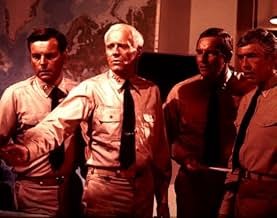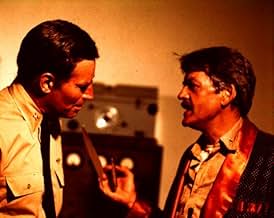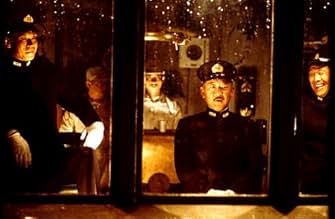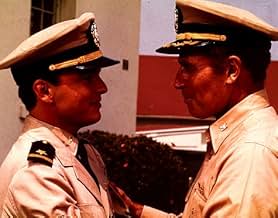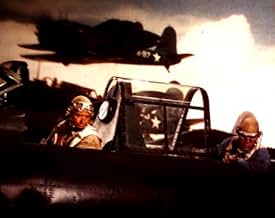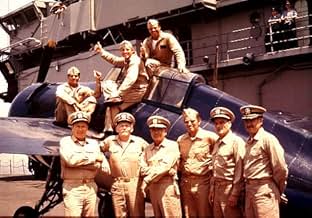IMDb-BEWERTUNG
6,8/10
22.567
IHRE BEWERTUNG
Die Schlacht um Midway im Pazifik gilt gemeinhin Wendepunkt des Zweiten Weltkriegs.Die Schlacht um Midway im Pazifik gilt gemeinhin Wendepunkt des Zweiten Weltkriegs.Die Schlacht um Midway im Pazifik gilt gemeinhin Wendepunkt des Zweiten Weltkriegs.
Toshirô Mifune
- Admiral Isoroku Yamamoto
- (as Toshiro Mifune)
Empfohlene Bewertungen
I remember reading that this movie was made primarily because they had excessive footage from when they shot "Tora! Tora! Tora! and some of the shot looks like they did came from that film. But this film also includes old actual shots taken by service men and news people.
The movie is based on the American victory off Midway Island. The movie was made 30 years after WWII and a couple of years after Vietnam, so it doesn't have a jingoistic feel to it. It has more of a matter of fact feel to it, more a docudrama than propaganda.
The movie is different from most war movies because it shows how Grand battles are won and lost. There isn't much individual heroism from ordinary soldiers shown. Instead we see how commanders, in this case admirals make decisions and take risks usually based on sketchy information. They put their reputations on line, along with the safety of their men, and the security of their nations. We see how the outcome of a battle can hinged on risky decisions or sometimes on indecision. We see how commanders have to sweat out their decisions as History hangs on the balance. Yes! History! This battle after all is considered the turning point of the War in the Pacific.
In this movie decisions are made on what certain letters mean, whether enemy carriers are where they are supposed to be. If viewers give it the appropriate attention, they will see that this movie plays like a giant chess match. The outcome determined by gutsy moves and bad decisions, sometimes indecision.
The movie boasts an impressive cast which include, Henry Fonda, Glenn Ford, Robert Mitchum, Cliff Robertson, Charlton Heston and they all do fine jobs. They play the typical Grand characters in epic movies, they move the story along but has no personal stories themselves. The one personal story belongs to Edward Albert, who plays Heston's son. He's not very convincing and playing opposite a pro like Mr. Heston, he comes across as being weak almost amateurish.
The movie is good but far from great. I love how the filmmakers remained true to the events. But the special effects looked cheap and the use of actual combat footage feels inappropriate and even exploitive. Nevertheless I think it's a good film not to be missed by Military History buffs.
The movie is based on the American victory off Midway Island. The movie was made 30 years after WWII and a couple of years after Vietnam, so it doesn't have a jingoistic feel to it. It has more of a matter of fact feel to it, more a docudrama than propaganda.
The movie is different from most war movies because it shows how Grand battles are won and lost. There isn't much individual heroism from ordinary soldiers shown. Instead we see how commanders, in this case admirals make decisions and take risks usually based on sketchy information. They put their reputations on line, along with the safety of their men, and the security of their nations. We see how the outcome of a battle can hinged on risky decisions or sometimes on indecision. We see how commanders have to sweat out their decisions as History hangs on the balance. Yes! History! This battle after all is considered the turning point of the War in the Pacific.
In this movie decisions are made on what certain letters mean, whether enemy carriers are where they are supposed to be. If viewers give it the appropriate attention, they will see that this movie plays like a giant chess match. The outcome determined by gutsy moves and bad decisions, sometimes indecision.
The movie boasts an impressive cast which include, Henry Fonda, Glenn Ford, Robert Mitchum, Cliff Robertson, Charlton Heston and they all do fine jobs. They play the typical Grand characters in epic movies, they move the story along but has no personal stories themselves. The one personal story belongs to Edward Albert, who plays Heston's son. He's not very convincing and playing opposite a pro like Mr. Heston, he comes across as being weak almost amateurish.
The movie is good but far from great. I love how the filmmakers remained true to the events. But the special effects looked cheap and the use of actual combat footage feels inappropriate and even exploitive. Nevertheless I think it's a good film not to be missed by Military History buffs.
A critical part of WWII gets the big epic cinematic treatment, with all star casting and lots of noise. Though purporting to be exactly how things were during this particular battle, a pinch of salt is also needed. Much of the film is taken up with laying foundations for the air-sea engagement of the title, political posturing and military machinations are joined by needless sub-plots. The dialogue is often cheese laden, some characterisations equally so, while the splicing of real life footage and other war movie moments start to detract. However, the last third of film is thrilling and worth waiting for, a whirl of battle action as the Pacific conflict comes vividly to life both visually and aurally. 6.5/10
I can't help but agree with most of the other comments: the sloppy production values, the scenes "borrowed" from better movies, the countless anachronisms, the distracting subplot about Lt. Garth and his Japanese girlfriend, and so on. But for me, this movie has two strong points in its favor. One, when they get around to the actual battle, they follow the history with surprising accuracy. (The "Pearl Harbor" makers could have learned something from this one.) So the movie's hard to follow? So was the actual battle! Personally, I think they did a pretty good job of keeping the flow coherent while still remaining faithful to its source material.
The second thing in its favor is that, from the moment I first saw it in the theater as a 10 year old, it ignited in me a passion for the Battle of Midway that remains to this day. I can't think of any other movie that even comes close to getting me as hooked on its subject as this one. Maybe it's a good thing I first saw it when I was young, when I was much less discerning about production values, etc. That way, I could concentrate on the story itself.
If you have even the slightest interest in military history or even in important historical events in general, do yourself a favor. Watch "Midway" to get an overview of the event (fast-forward over the love-story scenes if you like), then go read "Incredible Victory" by Walter Lord (which is a better book than the one for which he is most famous, "A Night to Remember"). You won't be sorry.
The second thing in its favor is that, from the moment I first saw it in the theater as a 10 year old, it ignited in me a passion for the Battle of Midway that remains to this day. I can't think of any other movie that even comes close to getting me as hooked on its subject as this one. Maybe it's a good thing I first saw it when I was young, when I was much less discerning about production values, etc. That way, I could concentrate on the story itself.
If you have even the slightest interest in military history or even in important historical events in general, do yourself a favor. Watch "Midway" to get an overview of the event (fast-forward over the love-story scenes if you like), then go read "Incredible Victory" by Walter Lord (which is a better book than the one for which he is most famous, "A Night to Remember"). You won't be sorry.
Saturday night TV is a bit of a dead zone down here so I suppose one should be grateful for the odd watchable movie, even if its 20 years old. This one looks older than it actually is, due to the liberal use of stock footage and a cast that's a retirement counsellor's dream. A relatively youthful Charlton Heston is in the lead, but there's Henry Fonda, Glenn Ford, Robert Mitchum, Robert Webber and even the great Japanese actor Toshiro Mifune. A curious aspect is that every military character with a speaking part is an officer; the grunts just get to grunt. It's very much the view from the bridge (and the pilot's seat). Despite this aspect and the attempt at historical realism it's not made clear quite how it was that the Japanese made the error that cost them the battle, getting caught with their flightdecks full just as the American torpedo bombers arrived. The contribution of the American land-based aircraft is also given scant recognition.
Still you do get a bit of a story, though the less said about the silly sub-plot involving the Heston character's son and a Japanese-American girl the better. The director, Jack Smight had extensive T V experience, as did many of the younger actors, and this shows up in the rather static dialogue scenes you get when you aren't allowed to move the cameras much. The Japanese voices are dubbed, so that Paul Free, the voice of Boris Badenov in "Bullwinkle," (and countless other cartoon characters) is Admiral Yamamoto. The music was written by John Williams who a year or so later did the music for "Star Wars" and you can sense the similarities.
In the film the military operations side of things abounds with anacronisms, partly due to the liberal use of stock footage as mentioned. I don't think you can be too hard on the producers (the low profile but financially successful Mirisch Brothers) for not using a real Japanese World War 2 aircraft carrier since they are all at the bottom of the sea, but the crashed jet on the Yorktown's flightdeck was a bit sloppy. "Tora Tora Tora," which cost more money, was a better film. Not because it cost more money but because it was more carefully made, more balanced (both side's story told well) and more honest, perhaps also because it dealt with defeat rather than victory from the American viewpoint. "Midway" has some suspense, plenty of action, and the the patriotism drum is not banged to the point of pain.
Still you do get a bit of a story, though the less said about the silly sub-plot involving the Heston character's son and a Japanese-American girl the better. The director, Jack Smight had extensive T V experience, as did many of the younger actors, and this shows up in the rather static dialogue scenes you get when you aren't allowed to move the cameras much. The Japanese voices are dubbed, so that Paul Free, the voice of Boris Badenov in "Bullwinkle," (and countless other cartoon characters) is Admiral Yamamoto. The music was written by John Williams who a year or so later did the music for "Star Wars" and you can sense the similarities.
In the film the military operations side of things abounds with anacronisms, partly due to the liberal use of stock footage as mentioned. I don't think you can be too hard on the producers (the low profile but financially successful Mirisch Brothers) for not using a real Japanese World War 2 aircraft carrier since they are all at the bottom of the sea, but the crashed jet on the Yorktown's flightdeck was a bit sloppy. "Tora Tora Tora," which cost more money, was a better film. Not because it cost more money but because it was more carefully made, more balanced (both side's story told well) and more honest, perhaps also because it dealt with defeat rather than victory from the American viewpoint. "Midway" has some suspense, plenty of action, and the the patriotism drum is not banged to the point of pain.
This was one of my favorite movies when I was growing up and building models of land, sea, and air craft of the WWII period. Of course we all could have done without the romantic interest, but what counts is the overall telling of the story accurately (even if that includes sideline dramatizations etc.). In a nutshell Midway was a gamble and even though we knew where they'd be, we still took it on the chin with the loss of most of the aircraft and the Yorktown (which left only 2 effective carriers in the pacific and 1 in drydock). In the end we were lucky enough to be able to inflict sufficiently more damage on them than they did on us. This is the story that is told so well. It doesn't matter that the special effects were less than stellar (e.g., view of the fleet from the sealevel - obvious miniatures) or that they showed Essex class carriers which did not yet exist getting hit by kamikaze. The film is true in its depictions of gambles, gaffs, and good fortune which in the end allowed us to be victorious and end Japanese expansion. So quit knocking it and enjoy it for what it is!
Wusstest du schon
- WissenswertesKevin Dobson's character Ensign George Gay, was the sole survivor of Torpedo Squadron 8. Gay wrote a book about his experiences (Sole Survivor) and was an advisor on this film.
- PatzerWhen the cockpit of one of the planes catches fire, the pilot pulls out a fire extinguisher. It is a more modern one, not a fire extinguisher that would have existed in the 1940s.
- Zitate
Vice Adm. Chuichi Nagumo: [commenting on the American torpedo bombers] They sacrifice themselves like samurai, these Americans.
- Alternative VersionenA television version exists, with additional cast and plot. It runs four hours with commercials. The main plot points are a Charlton Heston-Susan Sullivan romance and the Coral Sea battle (referred to in the other version) is played out like the Midway battle. The Coral Sea battle heavily features Mitchell Ryan as Admiral Aubrey Fitch and also includes a subplot where a young Japanese pilot who'd met with Admiral Nagumo to express his opposition to Japanese military action is shot down. At the end of the TV version, Sullivan and Christine Kukobo are both shown waiting dockside.
- VerbindungenEdited from Salute to the Marines (1943)
- SoundtracksIn the Mood
Music by Joe Garland
Performed by the Glenn Miller and His Orchestra (as Glenn Miller Orchestra) on the jukebox at the bar in Hawaii
Top-Auswahl
Melde dich zum Bewerten an und greife auf die Watchlist für personalisierte Empfehlungen zu.
- How long is Midway?Powered by Alexa
- Chicago Opening Happened When?
Details
Box Office
- Bruttoertrag in den USA und Kanada
- 43.220.000 $
- Eröffnungswochenende in den USA und in Kanada
- 4.356.666 $
- 20. Juni 1976
- Laufzeit2 Stunden 12 Minuten
- Farbe
- Seitenverhältnis
- 2.39 : 1
Zu dieser Seite beitragen
Bearbeitung vorschlagen oder fehlenden Inhalt hinzufügen

Oberste Lücke
By what name was Schlacht um Midway (1976) officially released in India in English?
Antwort

